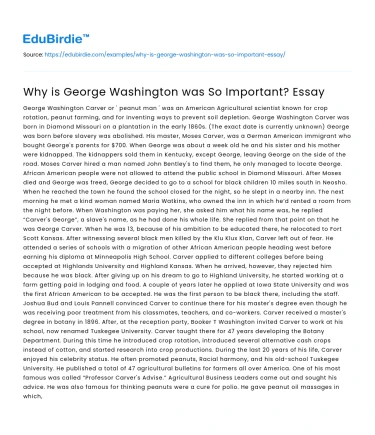George Washington Carver or ' peanut man ' was an American Agricultural scientist known for crop rotation, peanut farming, and for inventing ways to prevent soil depletion. George Washington Carver was born in Diamond Missouri on a plantation in the early 1860s. (The exact date is currently unknown) George was born before slavery was abolished. His master, Moses Carver, was a German American immigrant who bought George's parents for $700. When George was about a week old he and his sister and his mother were kidnapped. The kidnappers sold them in Kentucky, except George, leaving George on the side of the road. Moses Carver hired a man named John Bentley's to find them, he only managed to locate George.
African American people were not allowed to attend the public school in Diamond Missouri. After Moses died and George was freed, George decided to go to a school for black children 10 miles south in Neosho. When he reached the town he found the school closed for the night, so he slept in a nearby inn. The next morning he met a kind woman named Maria Watkins, who owned the inn in which he’d rented a room from the night before. When Washington was paying her, she asked him what his name was, he replied “Carver's George”, a slave's name, as he had done his whole life. She replied from that point on that he was George Carver. When he was 13, because of his ambition to be educated there, he relocated to Fort Scott Kansas. After witnessing several black men killed by the Klu Klux Klan, Carver left out of fear. He attended a series of schools with a migration of other African American people heading west before earning his diploma at Minneapolis High School. Carver applied to different colleges before being accepted at Highlands University and Highland Kansas. When he arrived, however, they rejected him because he was black. After giving up on his dream to go to Highland University, he started working at a farm getting paid in lodging and food.
Save your time!
We can take care of your essay
- Proper editing and formatting
- Free revision, title page, and bibliography
- Flexible prices and money-back guarantee
A couple of years later he applied at Iowa State University and was the first African American to be accepted. He was the first person to be black there, including the staff. Joshua Bud and Louis Pannell convinced Carver to continue there for his master's degree even though he was receiving poor treatment from his classmates, teachers, and co-workers. Carver received a master's degree in botany in 1896. After, at the reception party, Booker T Washington invited Carver to work at his school, now renamed Tuskegee University. Carver taught there for 47 years developing the Botany Department. During this time he introduced crop rotation, introduced several alternative cash crops instead of cotton, and started research into crop productions. During the last 20 years of his life, Carver enjoyed his celebrity status. He often promoted peanuts, Racial harmony, and his old-school Tuskegee University. He published a total of 47 agricultural bulletins for farmers all over America. One of his most famous was called “Professor Carver's Advise.” Agricultural Business Leaders came out and sought his advice. He was also famous for thinking peanuts were a cure for polio.
He gave peanut oil massages in which, the patients did report made them feel better. This is probably done to the care that Carver gave them not the peanut oil. Carver believed peanuts were almost the answer to everything. He even appeared to Muhammad Gandhi in the later years of his life proclaiming that peanuts could stop mass hunger in the African and Indian States/ providence's. Washington died after coming home from a meeting and falling down a flight of stairs. A maid rushed him to the hospital, and do to the complications, he died from anemia. He died at age 78 he was buried next to Booker T Washington at Tuskegee University. On his grave he requested for the following words to be engraved ' He could have added Fortune or Fame, but caring for neither, he found happiness and honor and being helpful to the world.' Later people learned numerous facts about George. An example is that he didn't keep specific facts about his experiment. This made them very hard to decipher to other agricultural scientists. He was never married because he was so focused on his work.
Conclusion
All in all, George Washington Carver was a very good scientist who led the revolution of many different rotation crops including corn, peanuts, and potatoes. He was a really good man who believed in racial harmony. He had many good ideas, and the country received a great loss when he passed away. He will always be remembered as one man who helped shape the country. He was given a Memorial in 1943 when Franklin Roosevelt honored him by commissioning $30,000 to the construction of the memorial park. You can now visit the park dedicated to him.






 Stuck on your essay?
Stuck on your essay?

